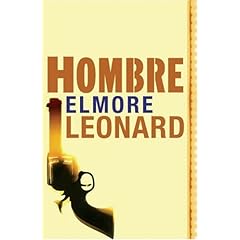
Right then. Why is HOMBRE often thought of as a 'classic'? I honestly don't know. Is it because it's told in the first person, and as such is the very first Western done in this way? No, since plenty of Westerns were written in this manner before 1961. Is it because of the historical accuracy apparent within the story? Nope, because Leonard's previous Westerns managed to pull this off well enough. So, is it because it deals, in a round-about way, with racism? Possibly.
"This wasn't any of my business. He couldn't help the ex-soldier, saying it was none of his business. All right, this was none of my business. If he wanted to act like an uncivilised person - which is what he must be and you could see it clearer all the time - then let him alone. Let him act any way he wanted."
Carl Allen is the narrator here, as he details his initial meeting with John Russell (the hombre of the title) and the stagecoach jouney that leads to the climatic stand-off between Russell, and a small gang of outlaws.
John Russell is a white man who was raised by Apaches. The crux of the story revolves around how others see him, and how he responds to them; from the corrupt government agent who stole from the Native Americans he'd been charged to protect, to the young lady recently rescued from savage Indians.
And that's pretty much it. Of course there are more characters, with a couple of interesting exchanges and confrontations, but the story and plot are both pretty thin on the ground - the book itself is only 168 pages long, and as such can easily be finished in a day, or a particularly slow afternoon.
Although HOMBRE may not be the epic Western some might claim, or want, it is still a decent example of pulp writing; we've got the inscrutable anti-hero, the ruthless bandit villain, and a few gunfights. The racism is quite standard for the time period, with it fuelling distrust more than anything else (such as inflammatory violence). Another thing HOMBRE does have going for it, though, is a pleasantly surprising ending.
However, as enjoyable as it is, it's not an example of Leonard's best work. Last Stand At Sabre River, his previous novel, is a better choice if you're trying to decide which of his earlier Westerns to check out. Like HOMBRE, it has a very simple story and plot (Confederate soldier returns from the Civil War to find Union soldiers using his farm), but expands on it to a more successful degree.



No comments:
Post a Comment